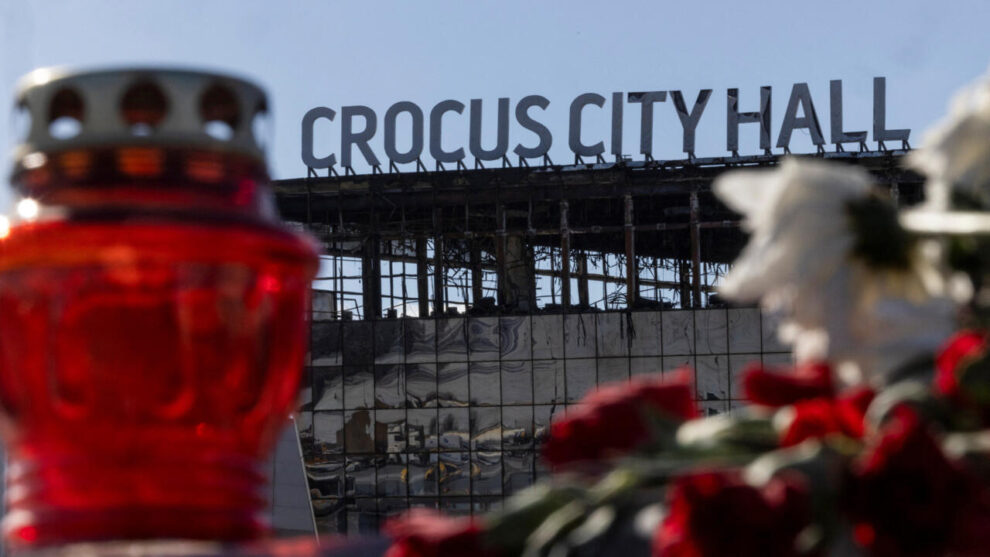In the days since the mass killing at the Crocus City concert hall near Moscow, blameless Tajik migrants across Russia have been subjected to threats, verbal abuse and increased harassment from law enforcement.
Panic is mounting – not just among Tajiks, but other Central Asian expatriate diasporas too – about the potential long-term fallout of intensified discrimination fueled by rage over an attack that has left more than 140 people dead.
Atovullo, a 35-year-old Tajik living in Moscow, told Eurasianet that his landlord summarily evicted him without explanation immediately after the Crocus attack, which investigators say was perpetrated by a gang of Tajik gunmen. It has always been difficult for people of non-European backgrounds to find apartments in the Russian capital – now it may become almost entirely impossible.
“Over the past year, the situation in Russia has been difficult. Constant [police raids on migrants], they treat you like you’re a criminal. Now it’s impossible to walk down the street, everyone is wary of you, avoiding you. They can just simply evict you, like you’re a dog,” Atovullo told Eurasianet.
The surnames of people interviewed for this article are not being published to preserve their anonymity.
Atovullo said he has now resolved to return to Tajikistan, mainly because he does not want his young children to be bullied.
There is little awaiting returnees back home. Tajikistan has the weakest economy anywhere in the former Soviet Union. Joblessness is rife. Remittances sent home by migrant laborers account for around four-fifths of the economy. Petty corruption and poverty often make starting a business a fruitless endeavor. Anybody complaining vocally about how things are run is liable to be jailed or called in for hostile interrogations by law enforcement.
According to official figures from 2023, around 1.3 million Tajiks live in Russia. This may be a major undercount, though, since an unknown quantity of migrant laborers does not appear in the official data. Tajiks do not need visas to enter Russia. For that reason, it is common for expat laborers to enter the country for seasonal work. Also complicating the data is the fact that growing numbers of Tajiks are obtaining Russian citizenship.
People volunteering in migrant solidarity networks in Russia have since the weekend been urging fellow expatriates to avoid leaving their home unless necessary. The Embassy of Tajikistan in Moscow has in a similar vein urged Tajik citizens to refrain from visiting crowded places.
Russian media have reported on the adoption of heightened security measures directed specifically at foreigners. Baza, a Telegram news channel, cited its sources as saying that police patrols and criminal investigation officers have been ordered to step up random checks on non-Russians. Squads of police have been dispatched to inspect hostels and other locations where foreigners might congregate.
Aggressive raids by migration officials were already routine. Russian media often carries reports of police swooping on apartments, workplaces and canteens used by foreign workers. From time to time, footage surfaces online showing detained migrants being subjected to degrading and violent behavior.
Officials like Alexander Bastrykin, the head of the Investigate Committee, a Russian analog of the FBI, have fanned anti-migrant sentiment by linking the rising incidence of murder and rape cases to foreign nationals.
“The majority of incomers do not integrate into Russian society. They do not study the Russian language and culture, they try to isolate themselves and keep to their own traditions,” he said at a conference in May.
Fresh calls for the mass deportation of migrants – and even their killing in more extreme cases – circulated on social media over the weekend. People ordering rides on taxi apps inquire before agreeing to take an order whether the driver is a Tajik. Drivers using taxi apps in major Russian cities are overwhelmingly foreign nationals, often from Central Asian countries.
Nekruz, a 23-year-old Tajik who works part-time for Yandex Taxi in St. Petersburg, said he has been asked by dozens of potential clients about where he is from. When they learn he is Tajik, they cancel the order, he said.
“A handful of individuals has brought shame on an entire people. Now they look at us like we’re cursed,” Nekruz told Eurasianet. “There is no sense of safety when you walk around the city. On closed groups on social media, you see comments about people wanting to form groups and take revenge.”
This dark climate has left some fearing for their lives.
Dilorom, another native of Tajikistan living in Russia, says she constantly looks over her shoulder.
“I am not going outside, and I won’t go to work on Monday,” she told Eurasianet over the weekend. “If I fall into the hands of embittered [xenophobes], there is no way of knowing that I can escape alive or have my rights upheld through the law.”
Four men suspected of carrying out the mass killings at the Crocus City hall were hauled into a Moscow court on March 24 bearing signs of extensive beating and torture. Russian authorities have made no pretense of abiding by legalities as they pursue their investigation into the massacre. Upright Tajik expatriates worry that they too will fall foul of this abandonment of legal niceties.
When Russia invaded Ukraine, conditions immediately worsened for any activists working on human rights issues. That included groups working to protect the rights of long-suffering migrant laborers. Almost all formal activists have left Russia, meaning that victims of abuse and fraud have nobody to turn to.
What little public solidarity there has been for Tajik communities has come from social media influencers. Russian rapper Timati, who has used his platform in the past to voice support for President Vladimir Putin and the invasion of Ukraine, posted a filmed appeal on Instagram to call on his supporters and fellow social media celebrities to refrain from inflammatory racist rhetoric and behavior.
“This is not acceptable, and it is not right. Dear influencers and opinion-shapers. Please turn on your brain. Who needs all this?” he said.
Atovullo, the Tajik expat living in Moscow, said he is seeing a surge of online social media activity attributing the Crocus City mass murder to uncontrolled migration. The consequences feel inevitable, he said.
“This has come as a massive blow for migrants. We will need to find work in other countries. If we cannot get jobs and we cannot get apartments, what are we to do? How can we stay in this country?” he said.
Source: Eur Asia Net










